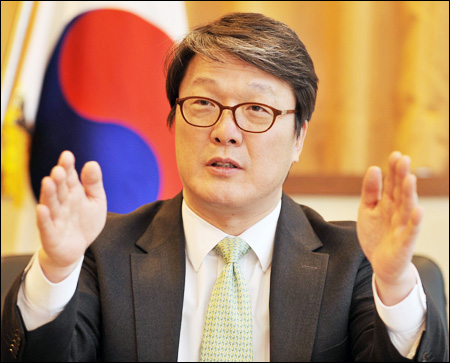Korea seeks diplomats with ‘entrepreneurial spirit’
Korea is shifting the focus of selecting and training rookie diplomats by putting an emphasis on a spirit of challenge.
This is aimed at enabling our corps of diplomats to better cope with the fast-changing global environment and to promote national interest.
Leading this change is Kim Byung-kook, the inaugural chancellor of the Korea National Diplomatic Academy (KNDA), who calls this zeitgeist an “entrepreneurial spirit.”
“Diplomats work for the sake of interest of their country and people,” he said. “To that end, I believe entrepreneurship is a critical element with which they (diplomats) incessantly explore new ways to maximize the benefits for their country and people.”
At present, diplomats are selected based on the results of foreign service exams, which critics say has heavily relied on rote-centered written tests. This will be abolished in 2013.
Kim’s academy will replace it and play the role of incubating diplomats from 2014, admitting and testing 60 contenders for one year before selecting the top 40 in rankings as second secretary, an entry-level position at the Ministry of Foreign Affairs and Trade.
The government has high hopes that the new system will help recruit more talented diplomats from diverse backgrounds.
The chancellor said the KNDA is a very special school that has never existed in the country’s history so that there are a variety of hurdles he faces in proceeding with the project. But he expressed a rosy outlook. “There are of course many difficulties I face while preparing for the school’s opening. But I have dealt with them with a positive mind, reminding me of the old saying ‘Where there’s a will, there’s a way.’”
The 53-year-old Harvard University graduate described himself as “project organizer,” a position in charge of all activities required in achieving the pre-defined project goals.
Kim, who assumed the seat in February, has created six taskforces in the KNDA to ensure smooth progress in curriculum design, professor recruitment, education material development, and other administrative affairs.
All the units are under the chancellor’s tight control to produce a clear picture of the school by later this year.
“I’m leader of all the taskforces and preside over their all meetings,” he said. “Sometimes I feel too burdened … But I also find myself interested and challenged.”
Observers say Kim is an extremely time-conscious perfectionist who even feels guilty for spending one second meaninglessly. His aggressive push seems to have prompted complaints from staffers that they are given too much workload and pressure.
But he took it as an inevitable rite of passage for the country to have, in the long run, the world’s best school of diplomacy.
He hinted that KNDA’s curriculum will heavily rely on case studies and humanities, especially literature, history and philosophy, to help develop students’ sense of reality and ability to come up with resolutions on diverse situations.
“There is no absolute answer in reality in dealing with foreign affairs,” he said. “KNDA students will be required to develop a breakthrough for diverse situations created on the basis of actual diplomatic affairs in the past with their critical and logical thinking.”
The KNDA is trying to benchmark curriculum and the teaching methods of the Fletcher School at Tufts University and the Kennedy School of Government at Harvard University, he said.
He underscored “flexibility” in hiring faculty members, saying he looks to emulate the recruiting system that is in operation at the Central European University in Budapest, Hungary.
“Only 60 percent of faculty members there are residential. The remaining 40 percent live around the world and visit the school only while the term is in session,” Kim said.
With the lifespan of knowledge getting shorter, he said, this system will be able to constantly provide students with up-to-date knowledge around the world and also inspire Seoul-based professors to try harder to catch up with the newest knowledge and trends. The KNDA will start recruiting overseas professors from July. <Korea Times/ Park Si-soo>


























































